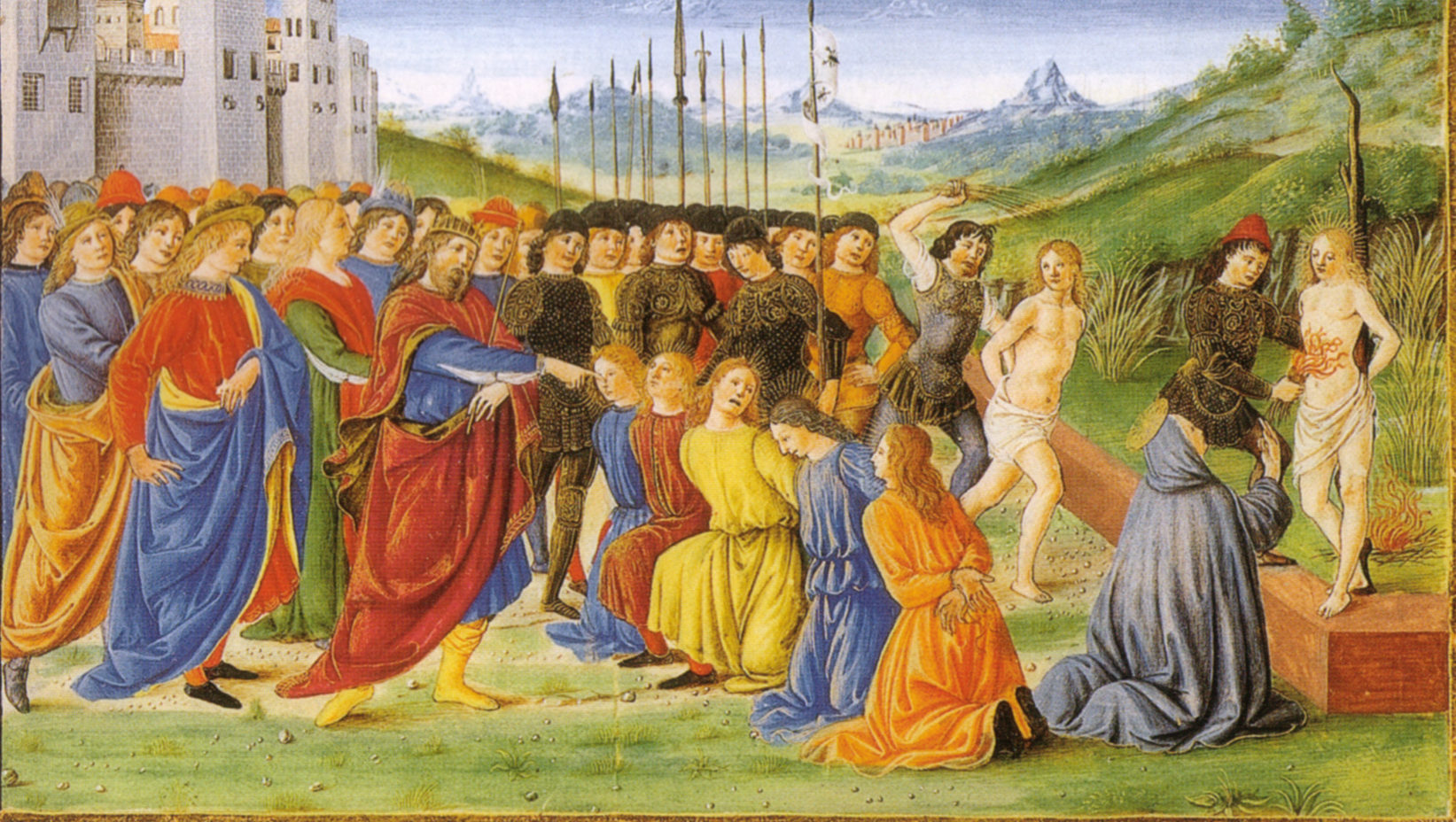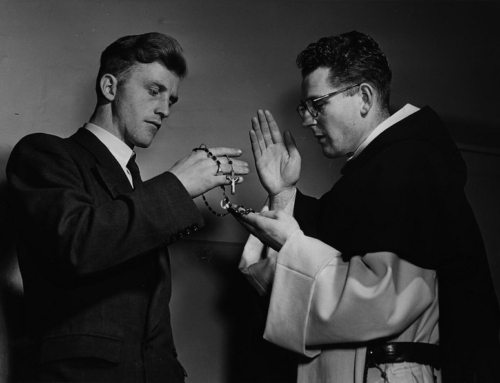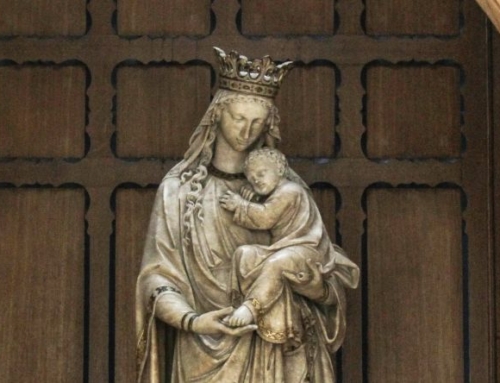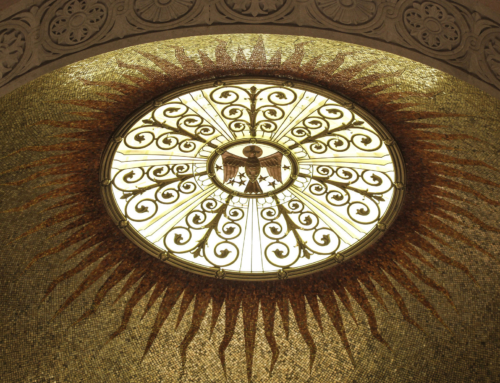Faith is like a mustard seed; it is the smallest grain until it grows into the largest bush. But mustard is grown especially to be tasted, and to taste a mustard seed it must be crushed, ground up into a powder so that its savor is unlocked and its aroma fills the room. It is the same with faith; trials and persecution bring out the fragrance of sanctity that would have otherwise remained known to God alone. So if we want to taste the flavor of sanctity in its strongest and most pungent form, we look to the martyrs.
This issue of Dominicana seeks to understand something of the roles of men, women and children in the Church. Thus, I want to turn your attention to a family of martyrs whose story is recounted in Sacred Scripture. Christians in America will probably never be tested as this family was, although their story is re-lived daily by God’s faithful who are still persecuted today throughout the world. In the extremes of martyrdom the principles and virtues that should animate every Christian, even those who will never face martyrdom, are made apparent.
The Books of Maccabees tell the history of Israel in the second century before Christ. The Seleucid Empire, encompassing much of modern-day Syria, had initiated an oppression of Judaism and a time of terrible persecution aimed at replacing faithful adherence to the law of God with Greek paganism. Israel’s champion, Judas Maccabee, for whom the books are named, eventually led a rebellion to free Israel from her foreign oppressors. But during the time of persecution before the rebellion began we find a family whose faith was tested by their enemies. Like a mustard seed crushed in a mortar, the strength of their faith is plain to see, and they exude the sweet fragrance of holiness.
So find your bible and read 2 Maccabees, chapters 6-7.
Eleazar, The Dignity of his Age
First, look at Eleazar, one of the foremost scribes, a man advanced in age and of noble appearance. He was required to violate the law of the Torah by eating pork, an unclean food, but steadfastly refused, “preferring a glorious death to a life of defilement” (2 Macc 6:10). Those conducting the unlawful inquisition, because of their long acquaintance with Eleazar, offered to set up a ruse for him: he would pretend to eat the forbidden meat, but actually eat lawful meat. Thus, his friends argued, Eleazar would remain undefiled, the persecutors would appear successful to their superiors, and nobody would have to die. It seemed so very reasonable!
But Eleazar refused, saying:
At our age it would be unbecoming to make such a pretense; many of the young would think the ninety-year-old Eleazar had gone over to an alien religion. If I dissemble to gain a brief moment of life, they would be led astray by me, while I would bring defilement and dishonor on my old age. Even if, for the time being, I avoid human punishment, I shall never, whether alive or dead, escape the hand of the Almighty. Therefore, by bravely giving up life now, I will prove myself worthy of my old age, and I will leave to the young a noble example of how to die willingly and nobly for the revered and holy laws (6:24-28).
Eleazar teaches us a threefold lesson. First, he knows that real faith must be lived publicly. This is a great lesson for us, to whom the temptation to hide our faith as something private is constantly present. The world tells us, over and over in many ways: “You can have your religion—as long as I can’t see it!” But a private faith, even if seemingly fulfilling the letter of the commandments, falls woefully short.
Second, Eleazar stands as a model of virtue attained over a lifetime. Holiness and virtue do not often come quickly, but require a lifelong habituation that prepares for the moment of testing. Because of his constancy in the fulfillment of God’s law in the upright life he had lived from childhood, Eleazar was able to act in a noble manner when his hair had grown gray.
Third, Eleazar is particularly conscious of the example he would set to the next generation, and in this he anticipates Christ’s words: “Whoever causes one of these little ones who believe in me to sin, it would be better for him to have a great millstone hung around his neck and to be drowned in the depths of the sea” (Matt 18:6) This theme runs throughout each of these martyrs’ stories: as members of the body of Christ, we are not alone in our faith. Our actions affect not only our salvation, but the salvation of others as well. The example we set can strengthen those who see us and encourage them to cling to Christ, or it can drive them away from his gift of everlasting life. We should tremble to think of this responsibility. If Eleazar had participated in this ruse and publicly renounced the law of God, would the next martyrs in our story have stood firm?
The Seven Brothers, Companions in Martyrdom
Groups of martyrs often appear in the Roman Calendar as St. So-and-so and Companions: St. Paul Miki and Companions, St. Charles Lwanga and Companions, for example. This is practical, as there is only so much text you can fit in one calendar, but there is also something spiritually significant about the custom. Martyrs, like every Christian, are not made holy on their own. So it was with the seven brothers martyred in Second Maccabees.
These brothers were martyred one after another, from oldest to youngest, each in a horrific and graphic manner. This trial threatened to divide the family and to pit brother against brother, but because of their faith, persecution instead strengthened and solidified their unity. They acted as one, for “one of the brothers, speaking for the others said: ‘what do you expect to learn by questioning us? We are ready to die rather than transgress the laws of our ancestors’” (7:2). Their unity was strong enough that one brother spoke for all in accepting martyrdom, and each in their own moment of testing ratified their brother’s words.
Their companionship was in turn a source of strength that each depended upon, as they encouraged each other in word and in example. As the eldest was martyred, “the brothers and their mother encouraged one another to die nobly, with these words: ‘The Lord God is looking on and truly has compassion on us…’” (7:5). It is all too easy, as each one of us knows, to forget the truth of God’s love in moments of temptation. In these times, the companionship of others can save us, as—like these brothers—we remind each other of the truth we forget or choose to ignore. And in turn, preaching these truths to our companions is itself an act of faith that strengthens our own adherence to them. The whole is indeed greater than the sum of the parts. And this preaching, this reminding, is not only in words but also in actions. By giving his life, each brother testified to the others that “God is looking on,” and through this testimony each brother was strengthened.
But what happened after each brother’s martyrdom? One by one they entered the heavenly paradise, of course, but what then? I would suggest, though certainty of this knowledge is beyond any man, that as each brother entered he turned and prayed for his brothers yet to be martyred. Standing before the throne of the Almighty, he interceded for his brothers whose trial was not yet complete, asking for the grace necessary to stand fast. And, I think, they would have especially prayed for their mother.
Most Admirable Mother
Mother Most Admirable, Mater Admirabilis, is properly a title of Mary the Mother of God. Perhaps we can read the mother in this story as a type and foreshadowing of Mary, for “most admirable and worthy of everlasting remembrance was the mother who, seeing her seven sons perish in a single day, bore it courageously because of her hope in the Lord” (7:20). She watched all seven of her sons die. Seven, a number of perfection and completeness, points towards Mary, who watched her perfect son die at the hands of sinful men.
This mother was, in a way, martyred eight times that fateful day. How did she bear it? “By her hope in the Lord” (7:20). Read her two speeches carefully:
I do not know how you came to be in my womb; it was not I who gave you breath and life, nor was it I who arranged the elements you are made of. Therefore, since it is the Creator of the universe who shaped the beginning of humankind and brought about the origin of everything, he, in his mercy, will give you back both breath and life, because you now disregard yourselves for the sake of his law. (7:22-23)
I beg you, child, to look at the heavens and the earth and see all that is in them; then you will know that God did not make them out of existing things. In the same way humankind came into existence. Do not be afraid of this executioner, but be worthy of your brothers and accept death, so that in the time of mercy I may receive you again with your brothers. (7:28-29)
This mother’s hope was founded upon two truths: God truly created all that is, including her own sons, and God will restore life to the righteous. A faith firmly grounded in these truths can withstand any trial; it is a house built on rock (Matt 7:24). For if God created all that is, then everything she possessed was a gift, even her very life and the life of her sons. She knew that she was a steward, not an owner, of these gifts. She knew that gifts are given out of love, that God’s mercy will never fail, and that he has the authority and power to protect those gifts as he wills. Most of all, she knew that the trials of this world are a passing pain, incomparable with the glories that await the just.
Joyful Suffering
In one way, this day was the worst day of this mother’s life as her family was killed before her eyes. In another way, this day was the best as her family, “after enduring brief pain, [drank] of never-failing life” (7:36). In one way, this day saw a family torn apart; in another their unity was never stronger. Her sorrow must have pierced her heart, and yet she must have been so proud of her sons. This paradox is the paradox of redemptive suffering, about which St. Paul says, “I rejoice in my sufferings for your sake” (Col 1:24). Joy and suffering are united within our participation in the Passion of Christ. The stories of these Maccabean martyrs can shed light on our own lives and the manner in which we ought to conduct ourselves, whether as a man, woman, or child in the Church. For every life will have suffering, but with the crushed mustard seed of faith, the hideousness of suffering is transformed by the fragrant aroma of sanctity rising up to the heavenly courts.
✠
Image: Attavante degli Attavanti, Martyrdom of the Seven Hebrew Brothers (PD-US, Art)
Download a PDF of this article HERE




